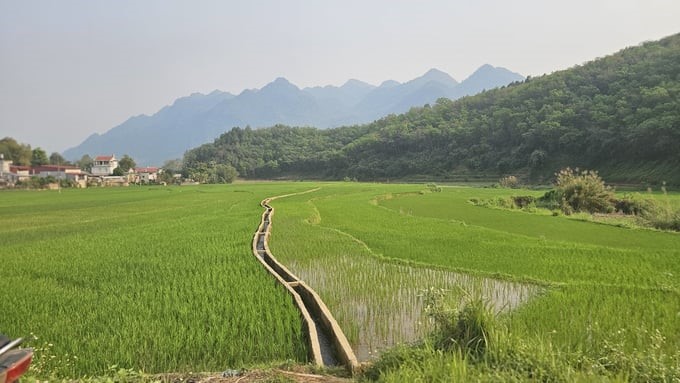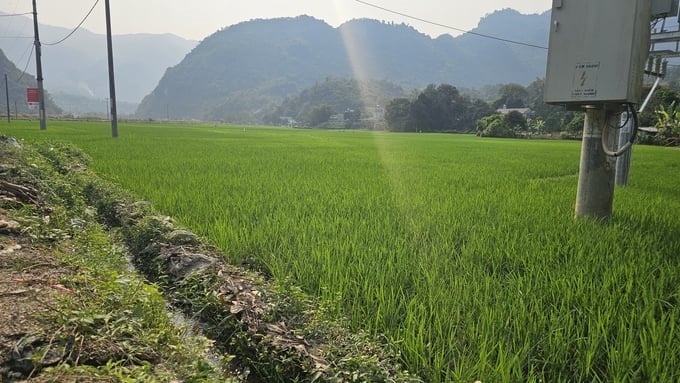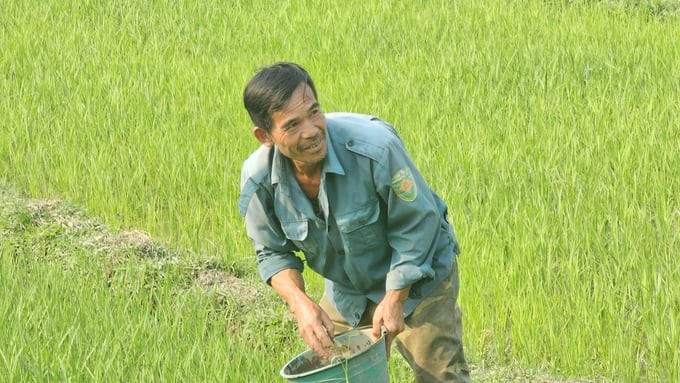November 27, 2025 | 18:49 GMT +7
November 27, 2025 | 18:49 GMT +7
Hotline: 0913.378.918
November 27, 2025 | 18:49 GMT +7
Hotline: 0913.378.918

A canal system brings water, helping farmers in Muong So commune (Phong Tho district, Lai Chau) produce stably. Photo: Hai Dang.
Phong Tho is a highland border district of Lai Chau province, with terrain divided by mountain ranges and alternated with small, narrow valleys where farmers live and cultivate.
Among the 17 communes and towns, Muong So commune can be considered the most concentrated rice farming place in this district, with 80% of farmers maintaining wet rice farming and shifting cultivation. Although farmers' lives are still difficult, compared to before, farming is much more convenient thanks to the canal system bringing water to fields.
Although the irrigation canal system in the commune has been invested in and built for a long time, it still maintains its operation and effectively supplies irrigation water for rice fields, meeting 100% of the farmers’ rice cultivation area.
In particular, the Commune People's Committee, together with agricultural irrigation groups, maintains and directly manages two irrigation structure systems in Huoi Sen and Muong So, maintaining water for approximately 30 ha of people's farming fields. The remaining nearly 170 ha are irrigated by three irrigation structures, Na Cung, Don Sang, and Nam Nhip, managed by Lai Chau Agricultural Irrigation Management Co., Ltd. Some of these irrigation structures are still earthen canals; the rest are solid canals.
“The Commune People's Committee directs and guides people in the villages and irrigation structure management groups to clear and dredge and regularly maintain five irrigation structures in the area to ensure irrigation water supply for production. The commune directs professional officers to regularly supervise the construction of structures to ensure compliance with approved documents and review and evaluate the current status of irrigation structures and domestic water in the commune," said Mr. Lo Van Bien, Vice Chairman of Muong So Commune People's Committee.

There are many earthen canals that are still effective thanks to regular dredging and clearing. Photo: Hai Dang.
From the crop preparation stage and during the crop season, the Commune People's Committee directs agricultural cadastral officers to coordinate with village heads to mobilize members of the agricultural irrigation group to dredge canals, helping to ensure the flow of production water for farmers and the set season.
At the same time, coordinate with villages to disseminate and mobilize people to protect the ecological environment, clean villages and hamlets, and not throw trash indiscriminately to prevent blockage of water-bringing canals.
Mr. Nong Duc Thin in Nam Cung village shared that the agricultural irrigation group is responsible for maintaining the operation of canals in the area to bring irrigation water to fields. Members of the 6-person group alternately perform daily reviews and inspections along the canals so that even minor damages can be detected and repaired immediately.
"With any damage, the commune reports it to the Department of Agriculture and Rural Development. However, with minor damages, the management group will self-fix them, together with the people. Any major damage will be proposed to the district for funding to fix it. In addition, farmers currently do not graze cattle freely, so there is no longer a scene of cattle damaging irrigation canals. April and May are the times when drought and local water shortages can occur for about 2 weeks. In response to this problem, the commune had a plan to use pumps to bring water to farmers for production," said Mr. Lo Van Bien.

The old farmer is excited because the newly transplanted rice is green and lush, thanks to the irrigation water being maintained evenly. Photo: Hai Dang.
Irrigation and centralized rural water supply structures in Phong Tho district stretch across 17 communes and towns and 170 villages and hamlets. Currently, the whole district has 193 irrigation structures and 152 centralized rural water supply projects. The total length of the district's canal route is up to 396km. Of which, 329km have been reinforced with concrete; the remaining more than 65km are earthen canals.
“By the end of 2023, irrigation and rural domestic water supply structures basically ensured the domestic and production water supply for people. However, due to the impact of natural disasters, a number of irrigation and rural domestic water supply structures in the district have been degraded and damaged and must be upgraded and repaired," said Mr. Trinh Van Doan, Vice Chairman of the Phong Tho District People's Committee.
According to Mr. Trinh Van Doan, in 2023, the district received an investment in newly building two new embankments and three irrigation structures, and upgrading and repairing six projects.
“After completion, irrigation structures and centralized rural water supply projects in the district will be handed over to the beneficiary units to self-manage, operate, and exploit. 100% of communes and towns (17/17) have established irrigation organizations at the base of enterprises, cooperatives, and cooperative groups. Operational management groups regularly carry out periodic inspections of projects, especially before, during, and after the rainy and flooding season," said Mr. Trinh Van Doan.
Irrigation structures in the district have contributed to promoting agricultural production in the area while solving difficulties in domestic and production water for people. This is an important condition for people to conveniently deploy production models combining tourism and services to promote the local economy.
Currently, farmers in Phong Tho district have planted nearly 740 ha of winter-spring rice according to the plan. During this time, taking advantage of the warm and sunny weather, people implement the tending, weeding, and pruning of the early rice area to ensure the seasonal frame. Cultivation has many advantages because the irrigation canal system operates effectively without a water shortage.
Translated by Huyen Vu Thu
/2025/11/27/3830-1-152901_403.jpg)
(VAN) Dong Nai is developing its key crop areas, expanding planting area codes, and applying high technology to increase the value of agricultural products, aiming at a green and sustainable agriculture.

(VAN) Tay Ninh’s livestock sector is undergoing a major transformation, applying high-tech, closed-loop circular models to build sustainable value chains.
/2025/11/26/3627-4-082628_818.jpg)
(VAN) From a small café on the red basalt highlands, Le Van Hoang started a business with clean coffee, building Enjoi Coffee into a symbol of organic agriculture in the Lam Dong plateau.
/2025/11/25/0045-1-135246_13.jpg)
(VAN) Ca Mau is researching a model of sea-encroaching embankments combined with viaducts and logistics service zones, aiming both to prevent erosion and create land funds for marine economic development.

(VAN) The information was shared at the seminar 'Urban Agriculture - Solutions for Developing Green Spaces,' organized by the Kinh te & Do thi Newspaper and the Biotechnology Center of Ho Chi Minh City.
/2025/11/19/4141-2-132831_216.jpg)
(VAN) One of Japfa's outstanding solutions is implementing digital transformation and artificial intelligence (AI) to optimize operations, enhance productivity, and advance sustainable development.
/2025/11/19/4847-1-093540_448.jpg)
(VAN) The Gia Lai Provincial People’s Committee had a working session with the delegation of the U.S. Department of Agriculture, the State of Idaho, and representatives of the State's leading enterprises.